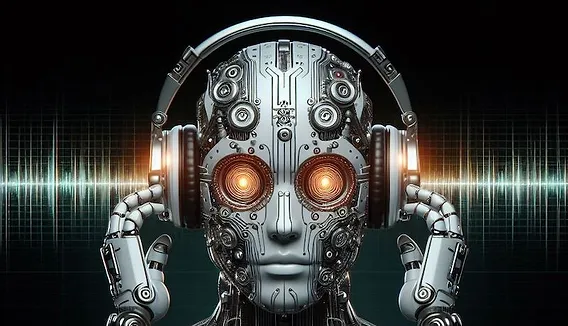Artificial intelligence has started to transform a number of industries recently, and the music industry is no exception. AI-generated music is becoming a revolutionary force, opening up new possibilities and problems for producers, listeners, and musicians alike as machine learning and algorithms develop.

The Evolution of AI in Music
Although artificial intelligence (AI) has been used in music for many years, major advancements have just lately been made. Simple rule-based systems were used in the early algorithmic composing studies, while modern AI models use deep learning to evaluate enormous volumes of musical data. It is possible to create music that is shockingly complicated and subtle thanks to these systems’ ability to comprehend and imitate complex musical structures, styles, and genres.
Well-known AI music systems, such as Google’s Magenta, OpenAI’s MuseNet, and AIVA (Artificial Intelligence Virtual Artist), can produce creative songs in a variety of genres, including pop, jazz, and classical. These techniques can be used to create whole new pieces of music by using neural networks to learn patterns and features from existing music. The end product is a diverse array of sounds that subverts preconceived ideas about creation and authorship.
The Impact on Music Creation
The way artists produce is being revolutionized by AI-generated music. AI technologies are now able to work with musicians as co-creators or as inspiration tools. Working together can hasten the songwriting process and provide musicians the chance to try out new sounds and genres they might not have otherwise thought of. Pop musicians, for instance, might employ AI to create melodies or chord progressions that they can subsequently edit and customize.
AI can also help with the production and arrangement stages of making music. Artificial intelligence (AI) algorithms can recommend the best instrumentation, production methods, and arrangements for tracks that perform well. This makes it simpler for musicians to create excellent music without needing to have a lot of technical experience.
Accessibility and Democratization
The possibility for AI-generated music to democratize music making is among its most intriguing features. As AI technologies become more widely available, aspiring musicians won’t need to spend a lot of money on studio time or undergo rigorous training to produce high-caliber music. This enhances the musical environment by providing a platform for a wide variety of voices and styles.
For example, independent musicians can use AI to produce distinctive sounds that set them apart from well-known performers. This promotes creativity and lowers access barriers, which in turn encourages a wider variety of music to thrive.
The Ethics of AI in Music
AI-generated music has many advantages, but it also presents significant ethical issues. This conversation centers on concerns about ownership, copyright, and what constitutes creativity. Who is the owner of an AI-created song? Who is to blame—the user, the programmer, or the AI itself? These issues put the current legal system to the test and call for fresh perspectives on intellectual property in the AI era.
Concerns exist regarding AI’s ability to stifle human creativity as well. Opponents contend that relying too much on AI technologies could homogenize music since musicians would choose to focus on what algorithms deem successful or popular rather than experimenting with unique or unusual sounds.

The Future of AI-Generated Music
AI technology will probably become more and more important in music as it develops. More advanced systems that can create music, assess listener preferences, and instantly modify tunes might be in the horizon. Imagine going to a concert where artificial intelligence (AI) creates music according to the mood of the crowd, making each performance feel different.
Furthermore, conventional music companies could need to change if AI-generated music becomes more popular. AI-generated music might become the emphasis of record labels instead of finding new artists, and AI could be used more and more in live performances.
Conclusion
The emergence of artificial intelligence-generated music showcases an intriguing convergence of technology and creativity. It will be crucial to navigate the opportunities and difficulties this change provides as we go forward. We can make sure that AI positively contributes to the rich tapestry of musical expression by embracing the possibilities and addressing the ethical concerns. This will ensure that the sound of tomorrow is a harmonic blend of human and machine innovation.
Leave a Reply